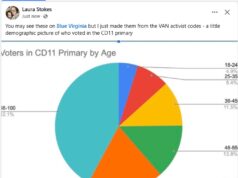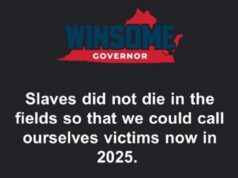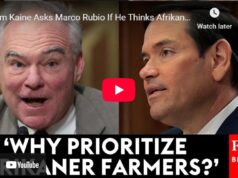See below for a superb public Facebook post by Karen Gautney– who now lives in Vermont, but who used to live in Alexandria, where she ran for the Democratic nomination for Virginia House of Delegates in 2012 – that is well worth reading and absorbing fully. Gautney encouraged us to share this “if you think it may resonate with others” – and I definitely do. I’ve added some bolding for emphasis, but really, this entire post is well worth reading.
THE OTHER THREE. I’m glad Derek Chauvin was arrested and I hope he’s convicted. I’m angry that George Floyd joins a long list of black Americans killed by excessive police force. From the beginning, by thoughts have focused on the other three officers—the two who were also kneeling on Mr. Floyd, and the one we saw standing near his head as he begged for relief, then died.
I’ve studied human systems, organizational culture and human behavior from different angles, including the criminal justice system, for decades. I’ve watched as my friends struggle to find the one thing…. the reason this happened, the key to fixing this, the perfect thing to say, the people to blame (sometimes turning on each other, sadly). But racism and police misconduct, and the confluence of the two, isn’t new and it won’t change easily no matter how intense our Facebook rage becomes.
My opinion—and this is my opinion and your different opinion doesn’t mean someone is wrong, by the way—is that the key to change rests in the other three. The “bystanding” officers are the culture. I don’t mean the broader culture, but the culture among Chauvin’s immediate colleagues. He knew he could count on them to support his behavior and he was right. He had known for years.
No matter how good an officer’s training, no matter how many speeches they hear from the higher ups, when s/he hits the streets s/he learns about the true culture among his/her peers that either tolerates or disallows abusive and discriminatory behavior. The culture is different from agency to agency, and can differ among divisions and squads within agencies. The signals are comments, facial expressions, micro aggressions, respect extended or withheld. Officers may observe a “minor” infraction that the perp had coming, which a supervisor and/or colleagues ignored, perhaps even congratulated the offending officer. There are myriad messages of us against them, that it’s okay to bend the rules or be a little extra with certain bad folks. After all, we are the good guys. We don’t take their shit. And above all, we stick together. I got your back if you’ve got mine.
I’ve been in situations where a suspect pushed my buttons, disrespected my authority, aroused my anger, and I wanted nothing more than to put that jerk in his place. LEOs are human. (So are you, and I’ve seen a few folks get so amped up on Facebook that I have to wonder how they would act in an in-person encounter!) When challenged we use, sometimes over-use, and sometimes even abuse whatever authority or privilege we have to get back on top. Most of us have the ability to self calm and remain professional, and bless the thousands of officers who do this every damn day. But it’s not just our own voice in our head at that critical moment. We know how far we can go without getting in trouble, how far we can go and still have the support of our peers. If peers are joining in, thumbs upping, high five-ing or merely standing by, we are emboldened. Most of us will not go beyond what our culture will support.
In the murder of George Floyd there were at least three officers who could have stopped it. “Okay, that’s enough.” A hand on his shoulder. “You got him; take a lap and we’ll get him in the car.” “Ease up, Derek.” “Tap out, man, move your knee right now!” Forcefully pulling him off, if needed. But none of that happened. There are lots of great police officers, but if a great one was there, he didn’t step up. The culture was known and then each officer, in his own way, helped Chauvin kill Floyd. You think you would have done something to stop it if you’d been there, if you were one of the other three. I think I would have, too. But my point is that it’s not just the facts of this killing that we need to examine, but the culture among that group of officers in the days, months and years leading up to it.
I’ve been thinking of all of the small system cultures we participate in—the culture in our immediate family, extended family, at work, at worship, the neighborhood, interest groups we join, political groups with which we associate, even your Facebook friend list. I don’t think anyone reading this will identify with Chauvin. We are the other three. And while few of us are engaged in life or death physical encounters, we contribute everyday to cultures that support or disallow maltreatment of people we perceive as “bad.” While we may not find ourselves in an arrest situation, or a life or death encounter, we regularly engage in experiences or discussions where “we” are good and “they” are bad. How do we talk about the “others”? What signals do we send about what we will tolerate? Do we model restraint or even kindness when we disagree with someone, when we are challenged? Do we demonize and name call, or make others the butt of our jokes? Can we walk away without “winning” a social media argument? The way we behave when tensions are high is important, but we cannot ignore that our behavior leading up to that moment creates the culture that prevails when emotion is ignited. I think we can do better. I know I can.












